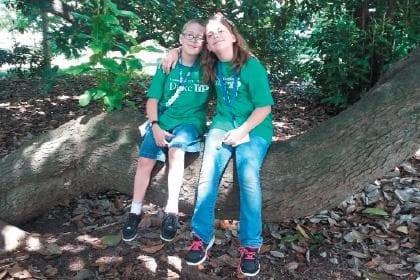
Research shows that when gifted students aren't properly challenged academically, the result can be boredom, poor study habits and even troubling behavior issues.
Published: October 31, 2017
By: Stephanie Rodda
Because gifted students excel in some areas, they might sometimes be perceived as needing no special help and doing just fine on their own. Unfortunately, their unique needs are sometimes overlooked because of this misconception. Just because they don’t struggle in the same way as other children in the academic setting does not mean they don’t face real challenges that need addressing.
Research shows that when gifted students aren’t properly challenged academically, the result can be boredom, poor study habits and even troubling behavior issues. Each child deserves the opportunity to reach their individual potential. Resources and training for teachers and other staff are necessary to be able to best serve all students.
Lannette Lackey, who is a gifted specialist with the Jefferson County Education System, expresses her concern about this underfunded area. “Gifted education just recently began receiving a tiny bit of funding. It is only about $3 per child, per year.”
Lackey explains that each child participating in the gifted education program has a GEP (general education plan) which outlines the services the child will receive. “All gifted students are supposed to receive a minimum of three hours per week in gifted pull out resource class,” she adds. And of course, the additional resources available differ from school to school and state to state.
According to the National Association for Gifted Children, and data collected in 2014-2015, of the 744,238 total student population of Alabama, the number of identified gifted students was 61,431. That’s a significant number of children and children are, after all our greatest resource and hope for the future of our state. They are worth investing in.
Children often need an advocate when it comes to their educational needs. Whether homeschooled or educated in public or private school, parents can be the most important advocate a student can have. Audrey Braxton Pitt has benefited from the support and guidance that Lackey and others in the public school system have provided.
Pitt has two children who participate in gifted education programs. “For me, they made themselves available for extra conferences, made me aware of special opportunities, and encouraged me to learn to advocate for my kids. I can’t speak to the level of support for all public schools, but in my personal experience, it has been phenomenal.”
Debbie Landry, homeschool administrator for Crossroads Christian School explains that many parents may doubt their ability to educate a gifted student at home and yet can be quite successful doing so. “Homeschooling is an individualized approach to education, designed by the parents for the student. So, parents of a gifted student would only be limited by their imagination,” she says.
Homeschooling parents “become experts in whatever their students need; they seek out the books, tools, resources they need for their students. This is across the board for regular students, gifted students, or special needs students,” Landry says.
According to the Alabama Association for Gifted Children, “Some families concerned about the availability of challenging content and rigorous instruction seek alternate options, such as private schools or home schooling.” It is always good to have options, however, due to economic limitations and other factors, public school is sometimes the only option for a child. Public school should have the proper funding to provide resources for the special needs of all students including those who are considered gifted.”
Programs such as Duke TIP (tip.duke.edu) is a valuable resource for gifted students. It provides many services and programs that meet the needs of gifted children that can be used to supplement or strengthen classroom and homeschooling efforts.
Pitt’s son and daughter have been members of Mensa International since they were nine. Known as ‘the high IQ society’, Mensa membership “provides them with a network of resources and support, as well as a local group of Young Mensans close to their age who participate in monthly outings.” More about Mensa, their requirements and benefits can be found at mensa.org.
Often students can be identified as possibly gifted in the second grade, as was the case with the Pitt family. This led to IQ testing and placement in gifted programs. Unfortunately, giftedness is not always so easily identified. According to Myths About Gifted Students, a PowerPoint presentation found at haikudeck.com, “Some gifted students also have learning or other disabilities.
These ‘twice-exceptional’ students often go undetected in regular classrooms because their disability and gifts mask each other.”
Whether we choose homeschooling, public school or private school, we all want the same thing. We want to provide the best chances for our children to learn and grow. Better training and resources for teachers and parents will result in better opportunities for all students, including gifted students.
Stephanie Rodda is an author, freelance writer and homeschooling mother. She lives in the Birmingham area with her husband and seven children.
